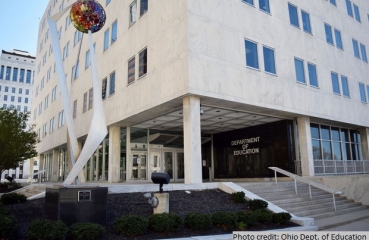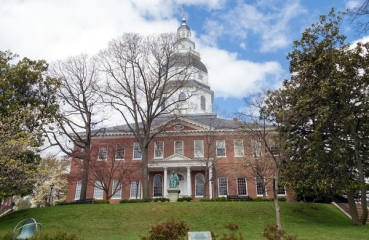The effects of early-grade retention in Florida
Amber M. Northern, Ph.D.By Amber M. Northern, Ph.D.
What a Democratic wave election would mean for education reform
Michael J. PetrilliIf the latest polls are to be believed, Hillary Clinton may be heading toward a landslide victory, especially as far as the Electoral College is concerned.
Charter Schools at the Crossroads: Predicaments, Paradoxes, Possibilities
Chester E. Finn, Jr., Bruno V. Manno, Brandon L. WrightOver the past quarter-century, charter schools have gone from an upstart education experiment to a prominent, promising, and disruptive innovation in K–12 education. Indeed, few observers present at the creation of the first charter schools could have predicted how rapidly this movement would spread or how thoroughly it would come to dominate the education-reform agenda.
Mike Petrilli on setting realistic goals under ESSA
The Education GadflyFind out why Fordham’s Mike Petrilli might have his school-reformer card repealed.
The best TV shows to watch with your kids
Michael J. PetrilliRegular readers know that I’m something of an apologist for “screen time,” at least within limits.
The health of America's teacher market
Kirsten HinckA new study by the Learning Policy Institute examines past and current trends in the teacher workforce to predict future educator supply levels. The study also examines motivations behind teacher attrition and suggests several policy options to mitigate the effects of teacher shortages.
Evaluating Denver's new proposal for teacher pay
Jamie Davies O'LearyThis report from A+ Colorado examines Denver’s ProComp (Professional Compensation System for Teachers), a system forged collaboratively between the district and teachers union in 2005 that was on the vanguard of reforming teacher pay scales.
The Batman v Superman edition
On this week’s podcast, Mike Petrilli, Alyssa Schwenk, and David Griffith discuss the titanic tussle between two tendentious tenets of school success measurement occurring among the mighty minds of Fordham and spilling out into the greater world. It’s proficiency vs. student growth. KA-THOOOOM! On the Research Minute, Amber tackles an early grade retention policy in Florida.
Charter school timeline: Twenty-five years later
Next week Chester E. Finn, Jr., Bruno Manno, and Brandon Wright’s book Charter Schools at the Crossroads: Predicaments, Paradoxes, Possibilities will be released.
Ohio’s sponsor evaluations: Take two
Kathryn MullenThe Ohio Department of Education (ODE) recently released the results of its revised sponsor evaluation, including new ratings for all of the state’s charter-school sponsors.
A letter to the editor on the difficulties with student growth measures
NOTE: The publication of a recent Flypaper post arguing that growth measures (like “value added” or “student growth percentiles”) are a fairer way to evaluate schools than are proficiency measures drew quick reaction both
Proficiency vs. growth: Same sport, different game
Robert PondiscioThe University of Mount Union in Alliance, Ohio is home to one of the most successful college football programs in America. The Purple Raiders have won twelve national championships since 1993 and have appeared in the title game eleven years in a row—a record of excellence matched by few collegiate teams in any sport.
Understanding the roles of public charter school boards and authorizers
Public charter school boards are often overlooked when it comes to assessing who and what contributes to public charter school quality. Yet these boards play an essential role. They provide the strategic vision for the school, hire leaders to run the school, hold those leaders accountable for academic success, and provide financial oversight. My colleagues and I at the D.C.
Disputing Mike and Aaron on ESSA school ratings
Chester E. Finn, Jr., Chad L. AldisThe central problem with making growth the polestar of accountability systems, as Mike and Aaron argue, is that it is only convincing if one is rating schools from the perspective of a charter authorizer or local superintendent who wants to know whether a given scho
Charter board members shape D.C.'s charter sector in a thousand small ways
In Charter School Boards in the Nation’s Capital, my co-author Allison Crean Davis and I provide a wealth of new information on charter boards in Washington, D.C.—but one simple fact merits further consideration: Sixty-two different boards oversee the scho
Competency-based education can better inform parents, students, and teachers
Mike Petrilli recently reopened an important conversation.
Is the "educator voice" missing on charter school boards?
Fordham’s latest study, Charter School Boards in the Nation's Capital, doesn’t disappoint.
Charter Schools at Twenty-Five: Humdrum or Revolutionary?
It’s been twenty-five years since Minnesota introduced chartering to America.
Why states should use student growth, and not proficiency rates, when gauging school effectiveness
Michael J. Petrilli, Aaron ChurchillOur goal with this post is to convince you that continuing to use status measures like proficiency rates to grade schools is misleading and irresponsible—so much so that the results from growth measures ought to count much more—three, five, maybe even nine times more—than proficiency when determining school performance under the Every Student Succeeds Act (ESSA).
Maryland school calendars: From bad to worse
Chester E. Finn, Jr.Maryland governor Larry Hogan has excellent political judgment. I wish I could say the same of his educational judgment.
The civility edition
On this week’s podcast, Mike Petrilli, Alyssa Schwenk, and David Griffith discuss how teachers ought to handle this year’s particularly polarizing and cringe worthy presidential election. During the research minute, Amber Northern explains how charter school boards affect school quality.




















